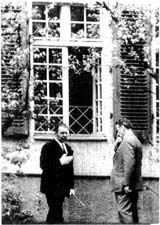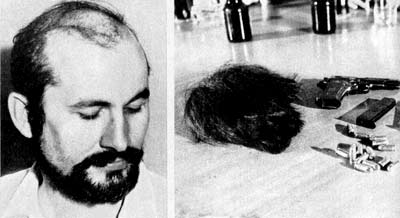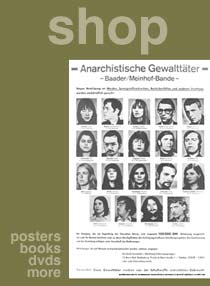pre-1968 > 1968 > 1969 > 1970 > 1971 > 1972 > 1973 > 1974 > 1975 > 1976 > 1977 > post-1977
.jpg) |
8 October 1970, Berlin - Irene Goergens (pictured here in police custody), is arrested at a Baader-Meinhof safe house along with Horst Mahler, Brigitte Asdonk, and Ingrid Schubert.
|
1970
Winter, Berlin
Ulrike Meinhof moves from her Dahlem apartment to an apartment on the fashionable Ku-Damm street, along with her twin daughters Bettina and Regine. Filming ends on "Bambule" and editing begins in preparation for a May air date.
February, Heidelberg
A young psychiatrist working at Heidelberg University gets fired. Dr. Wolfgang Huber has angered the university officials with his unorthodox therapy methods. In response to his firing, Huber's patients, mostly students, occupy the offices of Huber's hospital director, who ultimately agrees to keep Huber on.
Huber's radical psychiatric thesis is this: his patients are indeed sick. But their sickness is the product of Capitalist society, and the only way to cure them is to foment a Marxist revolution. Huber's patients organize themselves and the Socialists Patients Collective (SPK) is born.
Late February, Berlin
Two visitors show up at Ulrike Meinhof's door, needing a place to stay. Bettina and Regine are introduced to "Uncle Hans" and "Aunt Grete;" Andreas Baader and Gudrun Ensslin are back in Berlin.
Early March, Berlin
Baader and Ensslin meet up with Dieter Kunzelmann, whose West Berlin Tupamaros had been mildly terrorizing Berlin the previous year with humorous pranks, and potentially deadly bombs. Kunzelmann wants Baader and Ensslin to join his gang, but the talks break down when Baader suggests that he be the leader rather than Kunzelmann. Horst Mahler, the brilliant socialist lawyer, is at the meeting as well and encourages Baader and Ensslin to instead join up with the new group he is forming. Baader is more amenable to this suggestion; he figures that he can easily muscle Mahler aside once the group gets going.
Baader and Ensslin move out of Meinhof's apartment into a less conspicuous pad. The members of Mahler's new revolutionary army set about trying to secure weapons in their war on the Capitalist state. Among those involved at this early date are: Mahler, Baader, Ensslin, Astrid Proll, Manfred Grashof, his girlfriend Petra Schelm, and Mahler's secretary Monika Berberich.
3 April, Berlin
On their way from picking up a buried stash of guns, Astrid Proll and Andreas Baader are stopped by police. The cops quickly deduce that Baader is not the "Peter Chenowitz" listed on his forged ID card, but are not quite sure who they have on their hands so they take him into custody. Mahler inadvertently gives away Baader's identity the next morning when he calls the police station and asks for information about the arrest of "Herr Baader." "Only if you can confirm that the person we have in custody is, in fact, Herr Baader," replies the cop.
Mahler's group quickly directs most of its efforts towards getting Baader out of jail.
April, Berlin
Baader receives many visitors in his Tegel prison cell during his first month back in confinement. Mahler visits him many times, as does Berberich. Meinhof visits him as well, as does "Dr. Gretel Weitermeier," who is actually his fugitive girlfriend, Ensslin.
A plan is formulated to get Baader out. It involves a ruse in which Meinhof will claim to prison officials that she has been contracted to write a book with Baader. Meinhof and Baader would need to study at a library outside of the prison, requiring a brief leave from the prison under armed guard. During the leave, a "commando unit" would release Baader. The only sticking point would be securing the cooperation of Meinhof. Knowing for certain that she would have to make a complete break from her current life, including giving up her children, Meinhof is quite reluctant to participate.
Ensslin goes to work on Meinhof. Despite all of Meinhof's success in journalism, she is continually plagued by self-doubt. She worships the abrasive Ensslin, who was able to so successfully turn her Marxist theory into praxis with the Frankfurt bombings two years earlier. And Ensslin had so easily given up her own baby Felix in the name of the revolutionary cause. Ultimately Ensslin won Meinhof over with a combination of Ensslin's shrill persuasiveness and Meinhof's desire to belong. Meinhof begins making plans to send her kids underground immediately after the rescue of Baader. The action is set for mid-May.
The publishing house of Klaus Wagenbach is contacted and agrees to hire Baader and Ensslin; they are unaware that they are part of a ruse.
 |
14 May 1970, Berlin - Famous journalist Ulrike Meinhof helps convicted arsonist Andreas Baader escape from custody by jumping out of this window at Berlin's Dahlem Institute for Social Research.
|
14 May, Berlin
A car pulls up to the Dahlem Institute for Social Research. Two guards get out and escort a handcuffed Andreas Baader to the front door. An elderly employee of the Institute, Georg Linke, escorts them to the reading room, where Ulrike Meinhof waits. Baader's cuffs are removed and he and Meinhof set to work.
Two garishly dressed girls arrive at the front door, Irene Goergens and Ingrid Schubert. Linke lets them in, but makes them sit in the hall until Meinhof and Baader are done in the reading room. The front doorbell rings again, and the two girls trip the electric lock to let in a masked woman (Ensslin), and a masked man sporting a loaded Beretta (the man has never been identified). As Linke rushes to escape, the man shoot him in the liver, critically wounding him. The four, all now with guns in their hands, burst into the reading room, shooting wildly (but aiming low). Meinhof and Baader jump out the large picture window, with the other three following quickly behind them. The police never fire their weapons, certainly fearful of another Benno Ohnsesorg-type tragedy. In the conservative Springer Press a name is born: "the Baader-Meinhof Gang."
Meinhof's "Bambule," scheduled to air on Sunday, May 24, is pulled from the television schedule.
Late May, Berlin
The first German translation of Carlos Marighella's "Minimanual of the Urban Guerrilla" is published in Germany for the first time. Marighella was a Latin American revolutionary who had been killed the previous year by Brazilian police. His manual offers concrete advice for bringing traditionally rural Revolutionary tactics into the city. Mahler eats it up and quickly indoctrinates the other members of his group in its teachings. Marighella's first suggestion: get professional training.
2 June, Federal Republic
The German Press Agency received a communiqué (English Excerpt / German Full Text) claiming credit for securing Baader's release from prison. Probably written by Ulrike Meinhof, the communiqué is the first time that the group uses the term "Red Army," which later would give rise to their official name: Red Army Faction.
8 June, Amman, Jordan
Half of the group sneaks into East Berlin, and then heads to the Jordan desert to a Palestinian training camp, to be followed by the rest of the group a week later. In Jordan the fledgling guerrillas learn how to shoot guns, throw grenades, and thoroughly annoy their Palestinian hosts. After two months the Palestinians are completely sick of their disrespectful German guests and send them on a plane out of Jordan. The gang heads back to Berlin.
September, Italy
Stefan Aust, former editor of konkret, former friend of Ulrike Meinhof, and future biographer of the Baader-Meinhof Gang, meets up with group member Peter Homann, who had been kicked out of the group in Jordan. Homann tells Aust of Meinhof's two daughters, Bettina and Regine, who are secretly being cared for by two hippies at the foot of Mt. Etna. In Jordan, Homann overheard Meinhof agreeing to send the kids to Jordan to be raised as Palestinian terrorists; now he was soliciting Aust's help in returning the kids to their father.
Aust rescues the kids, returns them to their father, and for a while becomes a marked man of the Baader-Meinhof Gang.
Back in Berlin gang member Hans-Jürgen Bäcker recruits two motor mechanics, Karl-Heinz Ruhland and Eric Grusdat, into the periphery of the group. Mahler conceives of an audacious plan to rob four Berlin banks simultaneously.
September 29, Berlin
Three banks are robbed simultaneously in the early morning (a fourth bank job is canceled when the bank proves to be filled with construction workers). The robberies net over 200,000 DM.
Early October, Berlin
New recruits join the gang at a rapid clip. Jan-Carl Raspe and his girlfriend Marianne Herzog join, as does Ali Jansen.
 |
8 October 1970, Berlin - Horst Mahler is captured in Berlin along with several associates. Police also confiscated his toupee disguise, guns, and other material. |
October 8, Berlin
Acting on a tip, police stake out a Berlin apartment where they have been told that Baader, Ensslin, and Mahler will be meeting. Baader and Ensslin never show, but Mahler, Monika Berberich, Brigitte Asdonk and Irene Goergens are all captured.
10 October, Berlin
The surviving groups members meet up, and with Mahler gone, there is little doubt that Baader is in control. Suspicion turns towards Hans-Jürgen Bäcker as the snitch who gave away the location of the meeting place two days earlier. Bäcker denies everything, but quickly leaves; his days as a terrorist are over.
November-December, Federal Republic
The groups perfects its car-stealing technique, utilizing a "doubles method" where they put the license plate number and paperwork of a legal car onto a stolen car, thus eliminating questions if stopped by police. The group also uses some of their bank-job money to buy guns... a lot of guns.
Several new recruits come on board: Ulrich Scholze, Tinny Stachowiak, Beate Sturm and an earnest film student named Holger Meins.
4 December, Berlin
Eric Grusdat is arrested.
20 December, Frankfurt
Karl-Heinz Ruhland is arrested by the police and quickly begins talking. Though he never learns the real names of the other members of the gang (he only knew their code names), Ruhland will become a star witness at many of the Baader-Meinhof trials to come.
Later that night a nervous Ulrike Meinhof bolts at a police check point, leaving an ID card with a very recent picture of her newly-peroxided hair style.
23 December, Nuremberg
Ali Jansen and Ulrich Scholze are arrested after trying to steal a car. Jansen shoots at a cop; he later will get 10 years for attempted murder. Scholze is released the next day, leaving his terrorist days forever behind him.


